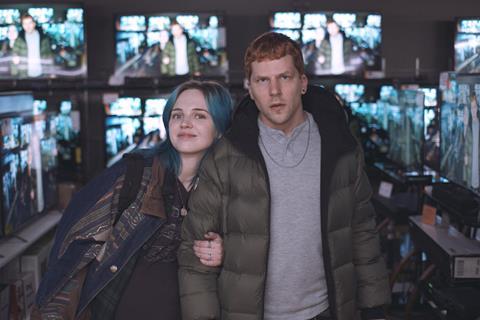Jesse Eisenberg is on a downward spiral in John Trengove’s unflinching portrait of toxic masculinity

Dir/scr: John Trengove. UK/USA. 2023. 95mins
There’s so much toxic masculinity on display in Manodrome that it practically curdles the celluloid. That’s largely by design. For his English-language debut, South African writer/director John Trengove presents an unflinching portrait of the disenfranchised white male, embodied by rage-filled Uber driver Ralphie (Jesse Eisenberg) who unravels to the point of extreme violence. Comparisons with Taxi Driver are obvious but, unlike Scorsese’s seminal study of isolation, this film attempts to take a neutral stance on the behaviour of its protagonist and consequently lacks the emotion or insight that may have put a unique spin on this well-trodden tale. Instead, it becomes another brutal slog through the unpleasant psyche of a troubled man.
Eisenberg impresses in a role which requires him to keep a great deal beneath the surface
Premiering in Berlin Competition, the film returns to the subject of masculinity that Trengove previously explored in 2018’s The Wound, which played in Panorama. While it’s not as nuanced as that South Africa-set film, the presence of both Eisenberg and Adrian Brody should fuel interest from further festivals and possibly attract distributors looking for bold voices. The subject matter is, however, a hard sell, and the film will undoubtedly divide audiences; mixed reviews may dilute its potential.
With his severely-cropped dyed ginger hair and built physique, Ralphie is a very different proposition from previous Eisenberg characters. Gone is the self-deprecating humour, the affable, awkward arrogance, to be replaced by a gruff, taciturn man who seems permanently on his guard. Wyatt Garfield’s furtive, claustrophobic camerawork constantly frames Ralphie in small spaces — his car, his sweaty underground gym, hemmed in at a restaurant dinner he can’t afford.
Ralphie is very much a product of his environment. His upstate New York stomping grounds (the film was shot in Syracuse) is a world away from Manhattan’s affluent gleaming spires. The gym where he flexes in the mirror, the bleak streets that he prowls for fares, the pawn shop where he exchanges stolen goods for cash are all shadowy, soulless places; both the colour palette and Christopher Stracey’s restrained score are deliberately cold and alienating.
Even the small flat Ralphie shares with heavily pregnant girlfriend Sal (Odessa Young, holding her own in a thankless role that was originally to be played by Riley Keough, who stays on board as a producer through her outfit Felix Culpa) doesn’t offer much in the way of comfort. With money tight, the impending arrival is weighing heavily on them both. But there’s more going on with Ralphie — a succession of nightmares hint at past trauma, hallucinations plague his waking hours, his furtive glances at fellow bodybuilder Ahmet (an excellent, enigmatic Sallieu Sesay) suggest that it’s not only his memories that he’s trying to suppress. Eisenberg impresses in a role which requires him to keep a great deal beneath the surface. But the screenplay locks up some elements of his character rather too tight and, as dramatic motivations for what follows, they are unpersuasive and somewhat cliched.
Ralphie is at a vulnerable low ebb when he is introduced to Dan (Adrien Brody), a relaxed and softly-spoken older man who projects a self-assured calmness that makes Ralphie’s jittery unease seem even more pronounced. It turns out that Dan is the head of an all-male enclave — the ‘manodrome’ of the title, inspired by the online ‘manosphere’ community of pro-male websites — who have taken a vow of celibacy, branded each other with tattoos and live together in a large house. All dark wood and roaring fires, the place feels like an an oasis of warmth and acceptance. It’s no wonder that Ralphie is tempted to turn his back on his life and join this gang. That means undergoing a series of intense cultish rituals designed to harness the superior masculine energy that, promises ‘Dad’ Dan — the younger men are ‘sons’, a knowing nod to queer culture tropes that these guys surely fail to recognise — will save Ralphie, if only he can fully embrace it.
That also means embracing a rampantly misogynistic world view, with women cast as the lesser sex who prevent these supposed alpha males from reaching their full potential. (That Dan has two failed marriages under his belt is telling.) Explicitly offensive anti-female slurs come thick and fast. While this attitude may be authentic to the culture depicted on-screen, the film leans into it more heavily than perhaps was needed, making it guilty of the very problem it is supposedly critiquing.
Indeed, that’s the main issue with Manodrome — it doesn’t really get under the skin of this sickening uber-masculinity, but paints it in broad strokes and asks us to make our own judgements. Nothing about it feels particularly revelatory. And if we are not meant to root for or relate to Ralphie, or learn from his journey, then why should we bear witness to his worst impulses?
Production companies: Liminal Content, Felix Culpa
International sales: CAA Media Finance, Noelle Aleman (assistant to Christine Hsu) christine.hsuasst@caa.com
Producers: Ben Giladi, Gina Gammell, Riley Keough, Ryan Zacarias
Cinematography: Wyatt Garfield
Production design: Carmen Navis
Editing: Julie Monroe, Matthew Swanepoel
Music: Christopher Stracey
Main cast: Jesse Eisenberg, Adrien Brody, Odessa Young, Sallieu Sesay







![The Brightest SunScreen[Courtesy HKIFF]](https://d1nslcd7m2225b.cloudfront.net/Pictures/274x183/3/5/0/1448350_thebrightestsunscreencourtesyhkiff_312678.jpg)















![The Brightest SunScreen[Courtesy HKIFF]](https://d1nslcd7m2225b.cloudfront.net/Pictures/100x67/3/5/0/1448350_thebrightestsunscreencourtesyhkiff_312678.jpg)
